Sustainable and Responsible Tourism Management Report - Analysis
VerifiedAdded on 2023/01/11
|18
|4908
|86
Report
AI Summary
This report provides a comprehensive overview of sustainable and responsible tourism management, with a specific focus on the Netherlands. It begins by tracing the evolution of sustainable tourism since the 1980s, highlighting key milestones and the roles of global organizations like the UNWTO. The report then delves into the purpose and principles of tourism development, emphasizing the importance of sustainable practices, resource conservation, and community involvement. It explores the impacts of tourism, both positive and negative, and discusses the principles of sustainability. The report examines the evolution of sustainable tourism, including the roles of various organizations. It also analyzes the concept of sustainable development as defined by leading organizations and the steps taken for conservation. Finally, the report concludes by evaluating sustainability in global tourism, emphasizing the need for responsible practices to ensure the long-term viability of the industry. The report also discusses the principles of tourism development and planning to minimize the adverse effects of tourism, including using resources sustainably, reducing waste, supporting local economies, maintaining biodiversity, and involving local communities.
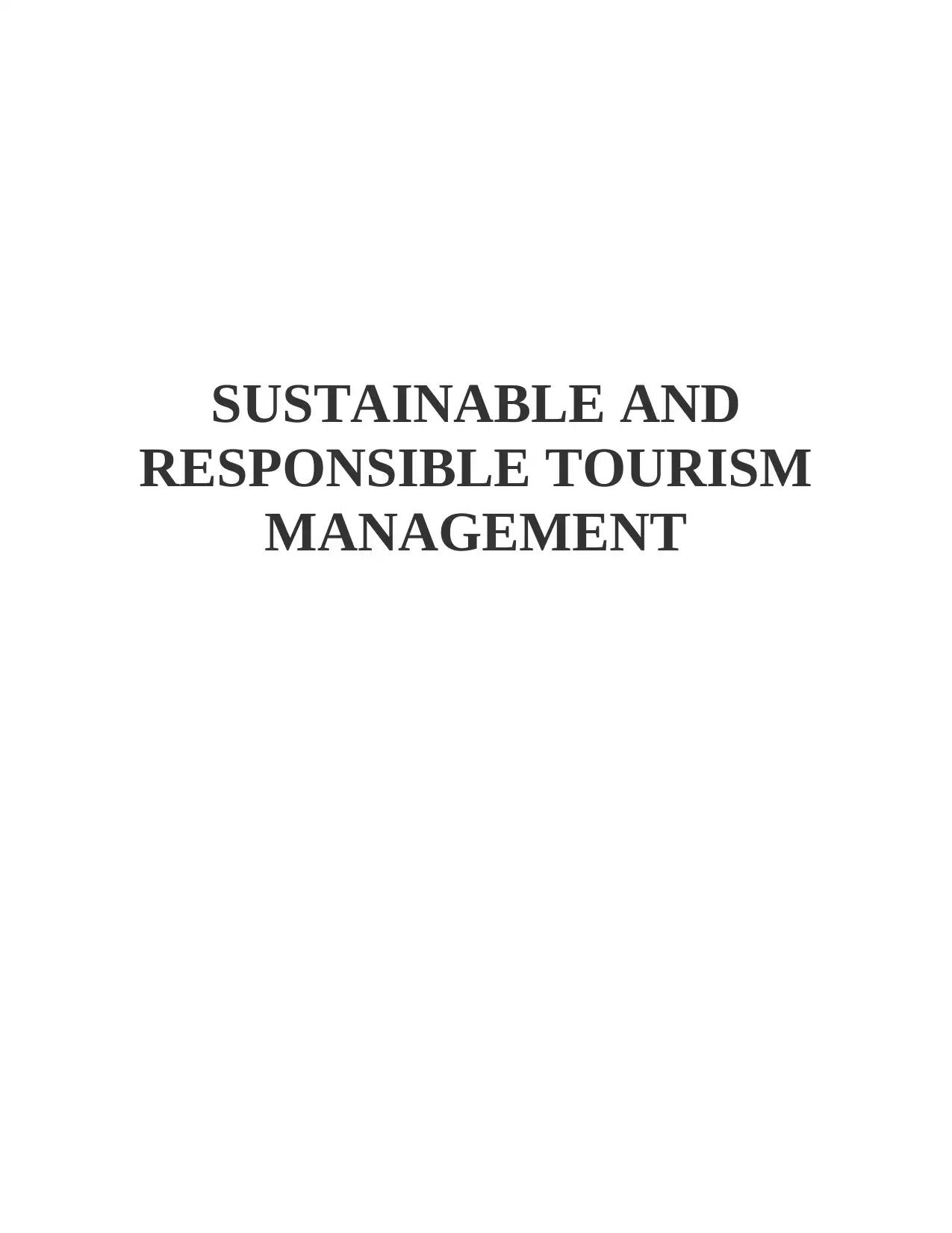
SUSTAINABLE AND
RESPONSIBLE TOURISM
MANAGEMENT
RESPONSIBLE TOURISM
MANAGEMENT
Paraphrase This Document
Need a fresh take? Get an instant paraphrase of this document with our AI Paraphraser
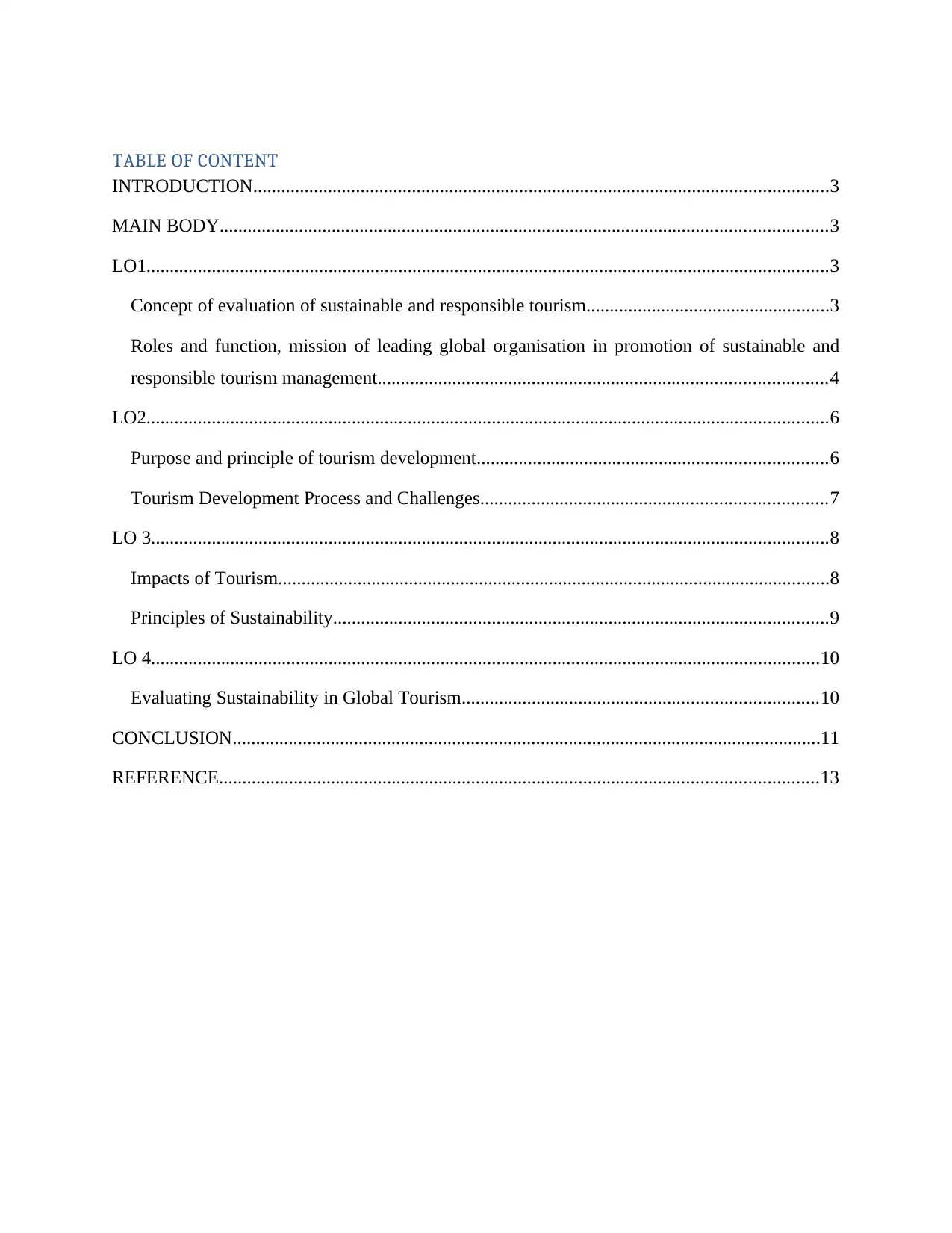
TABLE OF CONTENT
INTRODUCTION...........................................................................................................................3
MAIN BODY..................................................................................................................................3
LO1..................................................................................................................................................3
Concept of evaluation of sustainable and responsible tourism....................................................3
Roles and function, mission of leading global organisation in promotion of sustainable and
responsible tourism management................................................................................................4
LO2..................................................................................................................................................6
Purpose and principle of tourism development...........................................................................6
Tourism Development Process and Challenges..........................................................................7
LO 3.................................................................................................................................................8
Impacts of Tourism......................................................................................................................8
Principles of Sustainability..........................................................................................................9
LO 4...............................................................................................................................................10
Evaluating Sustainability in Global Tourism............................................................................10
CONCLUSION..............................................................................................................................11
REFERENCE................................................................................................................................13
INTRODUCTION...........................................................................................................................3
MAIN BODY..................................................................................................................................3
LO1..................................................................................................................................................3
Concept of evaluation of sustainable and responsible tourism....................................................3
Roles and function, mission of leading global organisation in promotion of sustainable and
responsible tourism management................................................................................................4
LO2..................................................................................................................................................6
Purpose and principle of tourism development...........................................................................6
Tourism Development Process and Challenges..........................................................................7
LO 3.................................................................................................................................................8
Impacts of Tourism......................................................................................................................8
Principles of Sustainability..........................................................................................................9
LO 4...............................................................................................................................................10
Evaluating Sustainability in Global Tourism............................................................................10
CONCLUSION..............................................................................................................................11
REFERENCE................................................................................................................................13
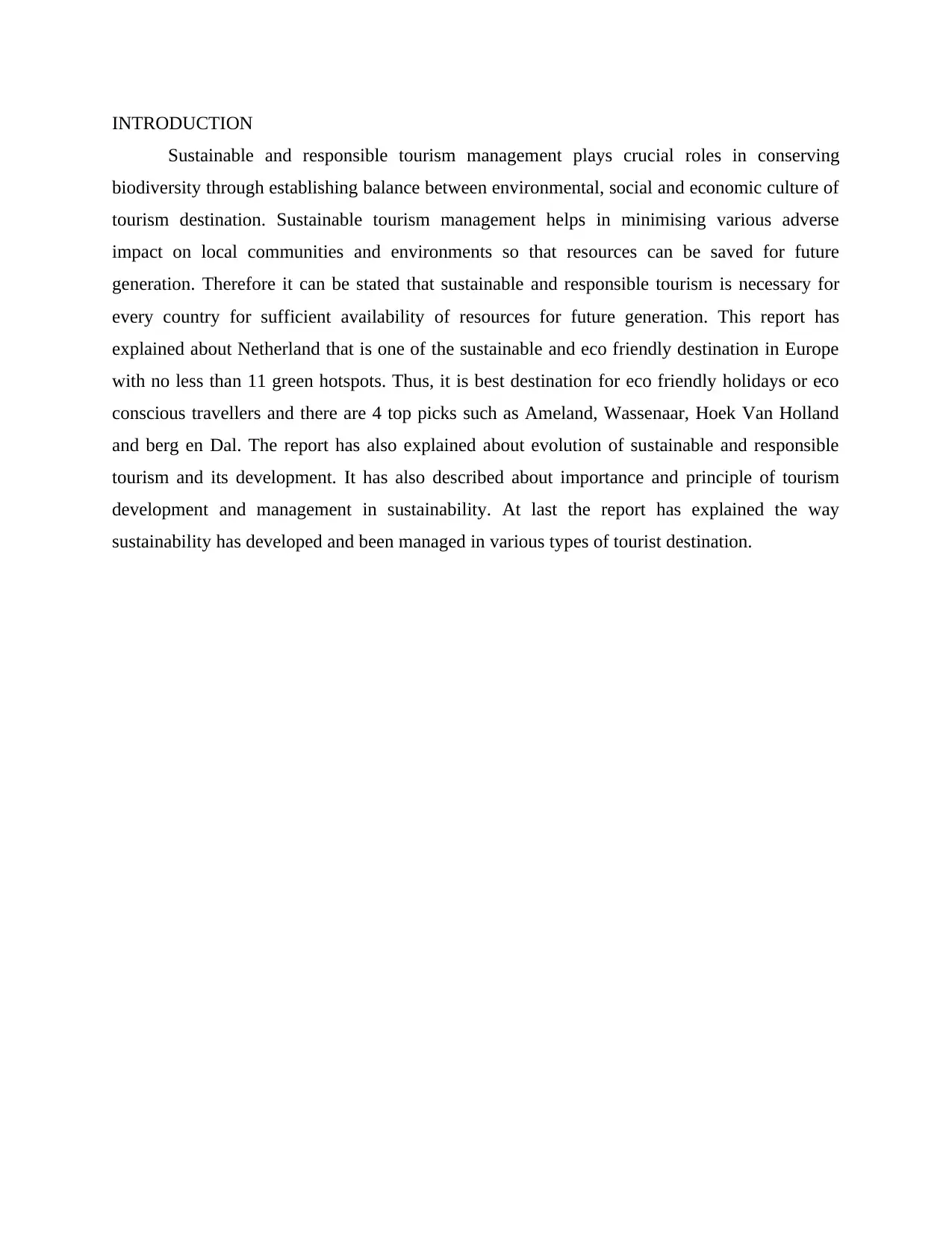
INTRODUCTION
Sustainable and responsible tourism management plays crucial roles in conserving
biodiversity through establishing balance between environmental, social and economic culture of
tourism destination. Sustainable tourism management helps in minimising various adverse
impact on local communities and environments so that resources can be saved for future
generation. Therefore it can be stated that sustainable and responsible tourism is necessary for
every country for sufficient availability of resources for future generation. This report has
explained about Netherland that is one of the sustainable and eco friendly destination in Europe
with no less than 11 green hotspots. Thus, it is best destination for eco friendly holidays or eco
conscious travellers and there are 4 top picks such as Ameland, Wassenaar, Hoek Van Holland
and berg en Dal. The report has also explained about evolution of sustainable and responsible
tourism and its development. It has also described about importance and principle of tourism
development and management in sustainability. At last the report has explained the way
sustainability has developed and been managed in various types of tourist destination.
Sustainable and responsible tourism management plays crucial roles in conserving
biodiversity through establishing balance between environmental, social and economic culture of
tourism destination. Sustainable tourism management helps in minimising various adverse
impact on local communities and environments so that resources can be saved for future
generation. Therefore it can be stated that sustainable and responsible tourism is necessary for
every country for sufficient availability of resources for future generation. This report has
explained about Netherland that is one of the sustainable and eco friendly destination in Europe
with no less than 11 green hotspots. Thus, it is best destination for eco friendly holidays or eco
conscious travellers and there are 4 top picks such as Ameland, Wassenaar, Hoek Van Holland
and berg en Dal. The report has also explained about evolution of sustainable and responsible
tourism and its development. It has also described about importance and principle of tourism
development and management in sustainability. At last the report has explained the way
sustainability has developed and been managed in various types of tourist destination.
⊘ This is a preview!⊘
Do you want full access?
Subscribe today to unlock all pages.

Trusted by 1+ million students worldwide
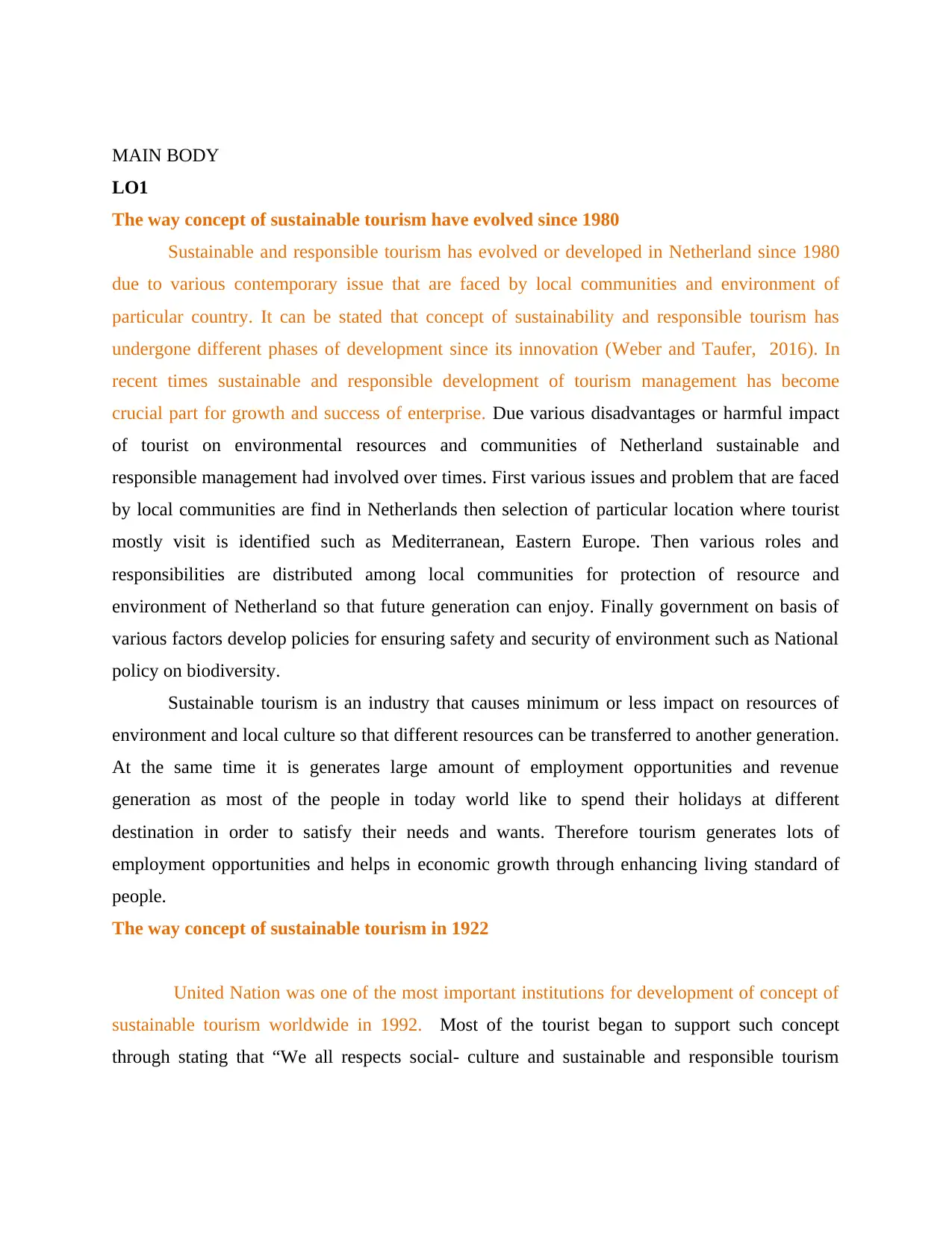
MAIN BODY
LO1
The way concept of sustainable tourism have evolved since 1980
Sustainable and responsible tourism has evolved or developed in Netherland since 1980
due to various contemporary issue that are faced by local communities and environment of
particular country. It can be stated that concept of sustainability and responsible tourism has
undergone different phases of development since its innovation (Weber and Taufer, 2016). In
recent times sustainable and responsible development of tourism management has become
crucial part for growth and success of enterprise. Due various disadvantages or harmful impact
of tourist on environmental resources and communities of Netherland sustainable and
responsible management had involved over times. First various issues and problem that are faced
by local communities are find in Netherlands then selection of particular location where tourist
mostly visit is identified such as Mediterranean, Eastern Europe. Then various roles and
responsibilities are distributed among local communities for protection of resource and
environment of Netherland so that future generation can enjoy. Finally government on basis of
various factors develop policies for ensuring safety and security of environment such as National
policy on biodiversity.
Sustainable tourism is an industry that causes minimum or less impact on resources of
environment and local culture so that different resources can be transferred to another generation.
At the same time it is generates large amount of employment opportunities and revenue
generation as most of the people in today world like to spend their holidays at different
destination in order to satisfy their needs and wants. Therefore tourism generates lots of
employment opportunities and helps in economic growth through enhancing living standard of
people.
The way concept of sustainable tourism in 1922
United Nation was one of the most important institutions for development of concept of
sustainable tourism worldwide in 1992. Most of the tourist began to support such concept
through stating that “We all respects social- culture and sustainable and responsible tourism
LO1
The way concept of sustainable tourism have evolved since 1980
Sustainable and responsible tourism has evolved or developed in Netherland since 1980
due to various contemporary issue that are faced by local communities and environment of
particular country. It can be stated that concept of sustainability and responsible tourism has
undergone different phases of development since its innovation (Weber and Taufer, 2016). In
recent times sustainable and responsible development of tourism management has become
crucial part for growth and success of enterprise. Due various disadvantages or harmful impact
of tourist on environmental resources and communities of Netherland sustainable and
responsible management had involved over times. First various issues and problem that are faced
by local communities are find in Netherlands then selection of particular location where tourist
mostly visit is identified such as Mediterranean, Eastern Europe. Then various roles and
responsibilities are distributed among local communities for protection of resource and
environment of Netherland so that future generation can enjoy. Finally government on basis of
various factors develop policies for ensuring safety and security of environment such as National
policy on biodiversity.
Sustainable tourism is an industry that causes minimum or less impact on resources of
environment and local culture so that different resources can be transferred to another generation.
At the same time it is generates large amount of employment opportunities and revenue
generation as most of the people in today world like to spend their holidays at different
destination in order to satisfy their needs and wants. Therefore tourism generates lots of
employment opportunities and helps in economic growth through enhancing living standard of
people.
The way concept of sustainable tourism in 1922
United Nation was one of the most important institutions for development of concept of
sustainable tourism worldwide in 1992. Most of the tourist began to support such concept
through stating that “We all respects social- culture and sustainable and responsible tourism
Paraphrase This Document
Need a fresh take? Get an instant paraphrase of this document with our AI Paraphraser
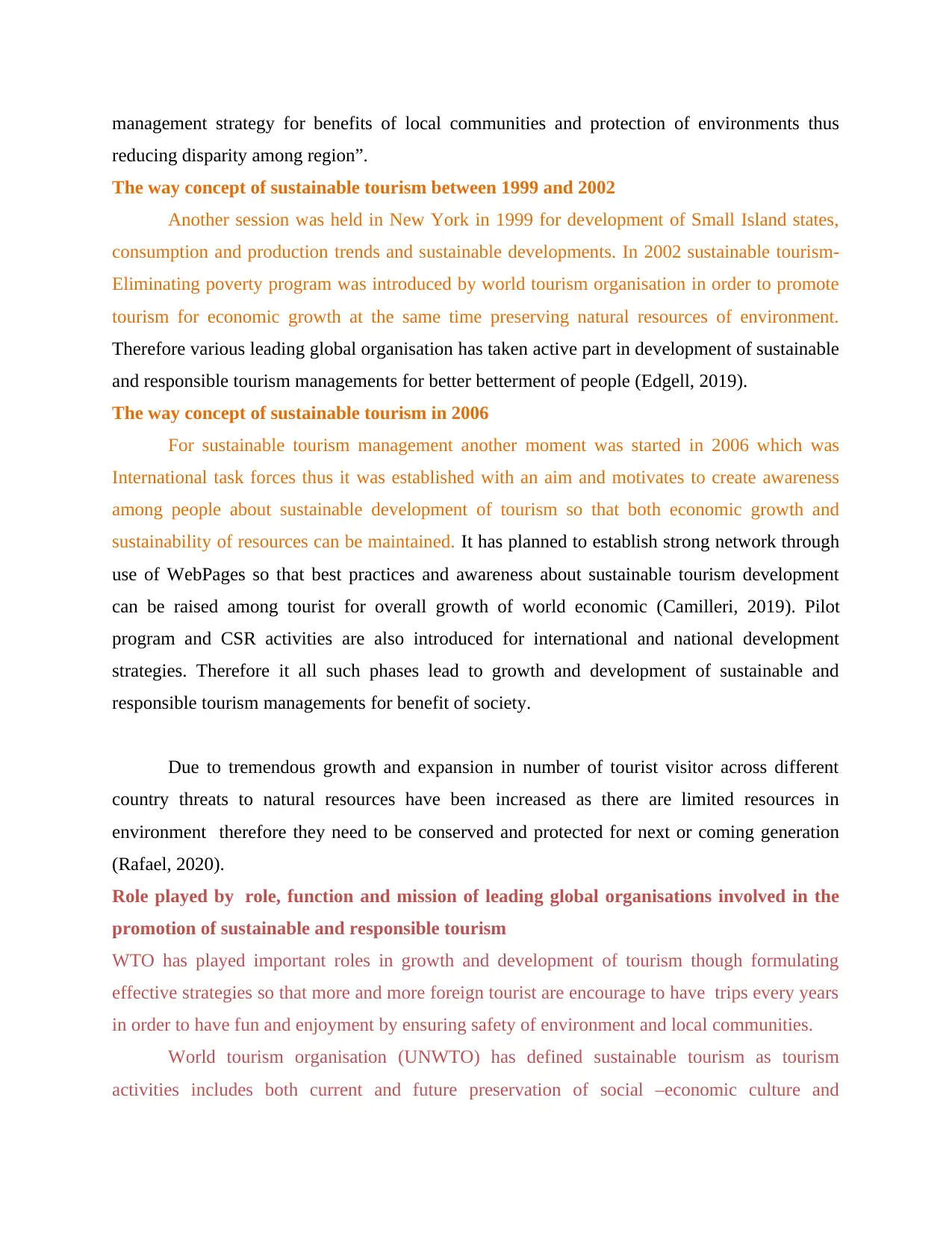
management strategy for benefits of local communities and protection of environments thus
reducing disparity among region”.
The way concept of sustainable tourism between 1999 and 2002
Another session was held in New York in 1999 for development of Small Island states,
consumption and production trends and sustainable developments. In 2002 sustainable tourism-
Eliminating poverty program was introduced by world tourism organisation in order to promote
tourism for economic growth at the same time preserving natural resources of environment.
Therefore various leading global organisation has taken active part in development of sustainable
and responsible tourism managements for better betterment of people (Edgell, 2019).
The way concept of sustainable tourism in 2006
For sustainable tourism management another moment was started in 2006 which was
International task forces thus it was established with an aim and motivates to create awareness
among people about sustainable development of tourism so that both economic growth and
sustainability of resources can be maintained. It has planned to establish strong network through
use of WebPages so that best practices and awareness about sustainable tourism development
can be raised among tourist for overall growth of world economic (Camilleri, 2019). Pilot
program and CSR activities are also introduced for international and national development
strategies. Therefore it all such phases lead to growth and development of sustainable and
responsible tourism managements for benefit of society.
Due to tremendous growth and expansion in number of tourist visitor across different
country threats to natural resources have been increased as there are limited resources in
environment therefore they need to be conserved and protected for next or coming generation
(Rafael, 2020).
Role played by role, function and mission of leading global organisations involved in the
promotion of sustainable and responsible tourism
WTO has played important roles in growth and development of tourism though formulating
effective strategies so that more and more foreign tourist are encourage to have trips every years
in order to have fun and enjoyment by ensuring safety of environment and local communities.
World tourism organisation (UNWTO) has defined sustainable tourism as tourism
activities includes both current and future preservation of social –economic culture and
reducing disparity among region”.
The way concept of sustainable tourism between 1999 and 2002
Another session was held in New York in 1999 for development of Small Island states,
consumption and production trends and sustainable developments. In 2002 sustainable tourism-
Eliminating poverty program was introduced by world tourism organisation in order to promote
tourism for economic growth at the same time preserving natural resources of environment.
Therefore various leading global organisation has taken active part in development of sustainable
and responsible tourism managements for better betterment of people (Edgell, 2019).
The way concept of sustainable tourism in 2006
For sustainable tourism management another moment was started in 2006 which was
International task forces thus it was established with an aim and motivates to create awareness
among people about sustainable development of tourism so that both economic growth and
sustainability of resources can be maintained. It has planned to establish strong network through
use of WebPages so that best practices and awareness about sustainable tourism development
can be raised among tourist for overall growth of world economic (Camilleri, 2019). Pilot
program and CSR activities are also introduced for international and national development
strategies. Therefore it all such phases lead to growth and development of sustainable and
responsible tourism managements for benefit of society.
Due to tremendous growth and expansion in number of tourist visitor across different
country threats to natural resources have been increased as there are limited resources in
environment therefore they need to be conserved and protected for next or coming generation
(Rafael, 2020).
Role played by role, function and mission of leading global organisations involved in the
promotion of sustainable and responsible tourism
WTO has played important roles in growth and development of tourism though formulating
effective strategies so that more and more foreign tourist are encourage to have trips every years
in order to have fun and enjoyment by ensuring safety of environment and local communities.
World tourism organisation (UNWTO) has defined sustainable tourism as tourism
activities includes both current and future preservation of social –economic culture and
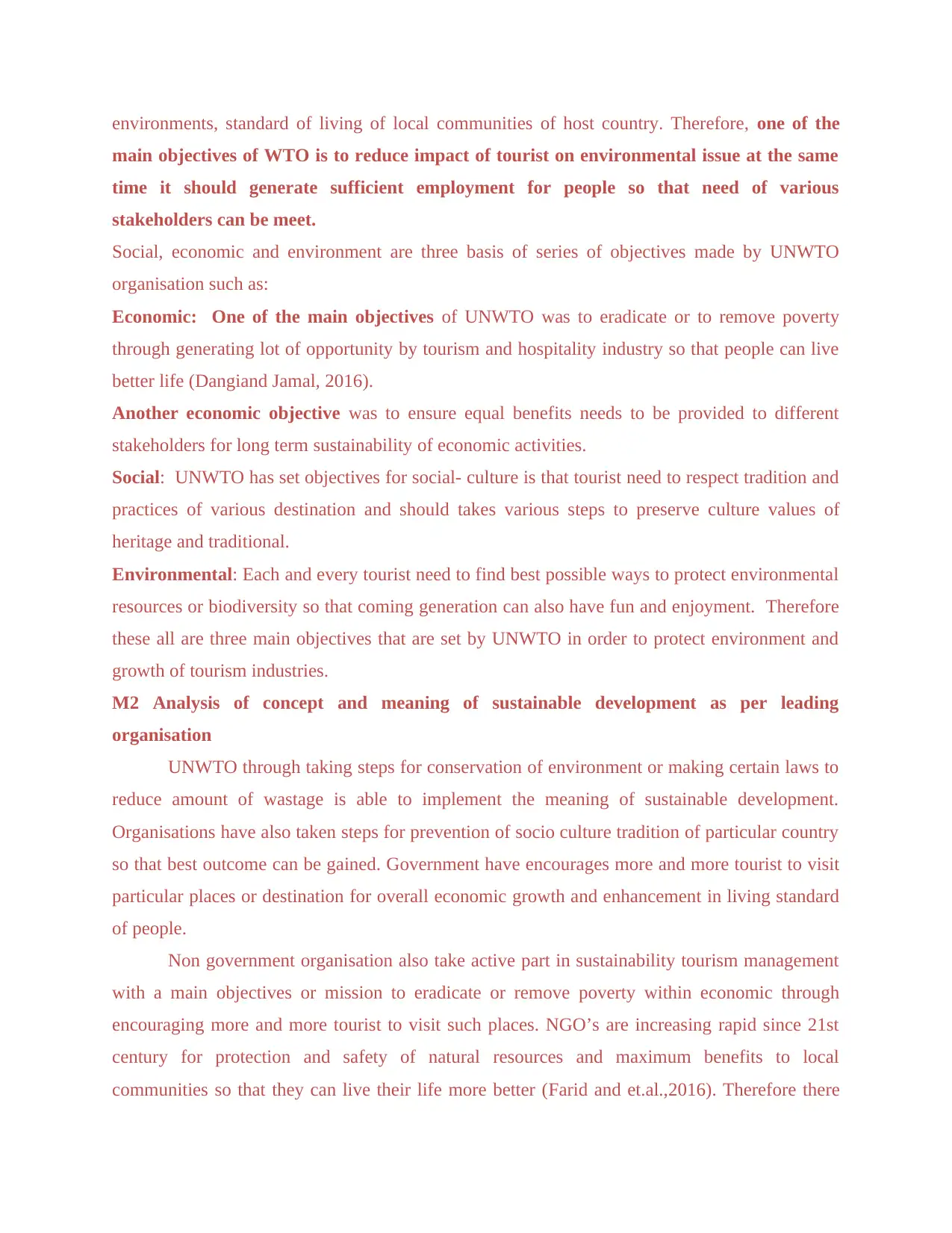
environments, standard of living of local communities of host country. Therefore, one of the
main objectives of WTO is to reduce impact of tourist on environmental issue at the same
time it should generate sufficient employment for people so that need of various
stakeholders can be meet.
Social, economic and environment are three basis of series of objectives made by UNWTO
organisation such as:
Economic: One of the main objectives of UNWTO was to eradicate or to remove poverty
through generating lot of opportunity by tourism and hospitality industry so that people can live
better life (Dangiand Jamal, 2016).
Another economic objective was to ensure equal benefits needs to be provided to different
stakeholders for long term sustainability of economic activities.
Social: UNWTO has set objectives for social- culture is that tourist need to respect tradition and
practices of various destination and should takes various steps to preserve culture values of
heritage and traditional.
Environmental: Each and every tourist need to find best possible ways to protect environmental
resources or biodiversity so that coming generation can also have fun and enjoyment. Therefore
these all are three main objectives that are set by UNWTO in order to protect environment and
growth of tourism industries.
M2 Analysis of concept and meaning of sustainable development as per leading
organisation
UNWTO through taking steps for conservation of environment or making certain laws to
reduce amount of wastage is able to implement the meaning of sustainable development.
Organisations have also taken steps for prevention of socio culture tradition of particular country
so that best outcome can be gained. Government have encourages more and more tourist to visit
particular places or destination for overall economic growth and enhancement in living standard
of people.
Non government organisation also take active part in sustainability tourism management
with a main objectives or mission to eradicate or remove poverty within economic through
encouraging more and more tourist to visit such places. NGO’s are increasing rapid since 21st
century for protection and safety of natural resources and maximum benefits to local
communities so that they can live their life more better (Farid and et.al.,2016). Therefore there
main objectives of WTO is to reduce impact of tourist on environmental issue at the same
time it should generate sufficient employment for people so that need of various
stakeholders can be meet.
Social, economic and environment are three basis of series of objectives made by UNWTO
organisation such as:
Economic: One of the main objectives of UNWTO was to eradicate or to remove poverty
through generating lot of opportunity by tourism and hospitality industry so that people can live
better life (Dangiand Jamal, 2016).
Another economic objective was to ensure equal benefits needs to be provided to different
stakeholders for long term sustainability of economic activities.
Social: UNWTO has set objectives for social- culture is that tourist need to respect tradition and
practices of various destination and should takes various steps to preserve culture values of
heritage and traditional.
Environmental: Each and every tourist need to find best possible ways to protect environmental
resources or biodiversity so that coming generation can also have fun and enjoyment. Therefore
these all are three main objectives that are set by UNWTO in order to protect environment and
growth of tourism industries.
M2 Analysis of concept and meaning of sustainable development as per leading
organisation
UNWTO through taking steps for conservation of environment or making certain laws to
reduce amount of wastage is able to implement the meaning of sustainable development.
Organisations have also taken steps for prevention of socio culture tradition of particular country
so that best outcome can be gained. Government have encourages more and more tourist to visit
particular places or destination for overall economic growth and enhancement in living standard
of people.
Non government organisation also take active part in sustainability tourism management
with a main objectives or mission to eradicate or remove poverty within economic through
encouraging more and more tourist to visit such places. NGO’s are increasing rapid since 21st
century for protection and safety of natural resources and maximum benefits to local
communities so that they can live their life more better (Farid and et.al.,2016). Therefore there
⊘ This is a preview!⊘
Do you want full access?
Subscribe today to unlock all pages.

Trusted by 1+ million students worldwide
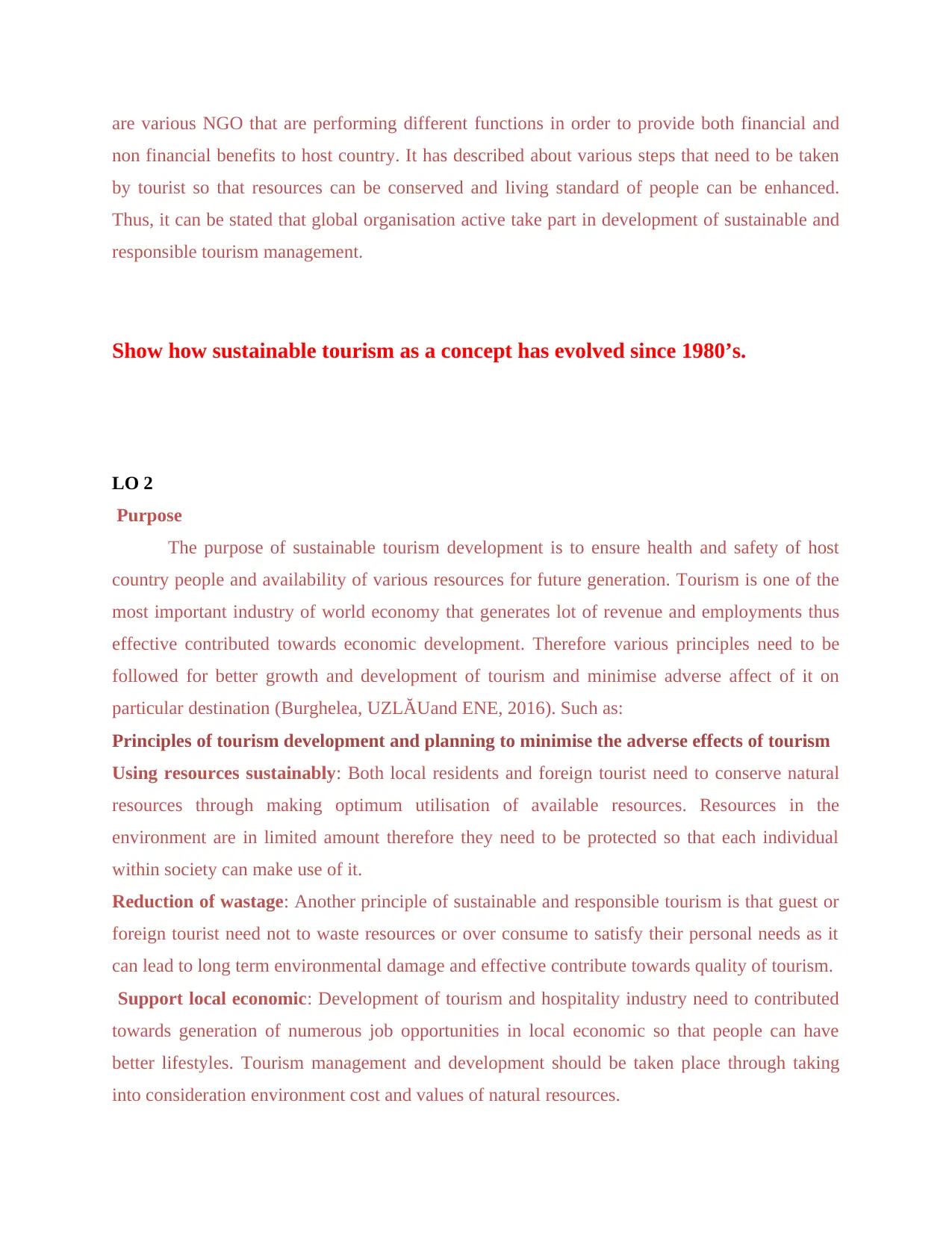
are various NGO that are performing different functions in order to provide both financial and
non financial benefits to host country. It has described about various steps that need to be taken
by tourist so that resources can be conserved and living standard of people can be enhanced.
Thus, it can be stated that global organisation active take part in development of sustainable and
responsible tourism management.
Show how sustainable tourism as a concept has evolved since 1980’s.
LO 2
Purpose
The purpose of sustainable tourism development is to ensure health and safety of host
country people and availability of various resources for future generation. Tourism is one of the
most important industry of world economy that generates lot of revenue and employments thus
effective contributed towards economic development. Therefore various principles need to be
followed for better growth and development of tourism and minimise adverse affect of it on
particular destination (Burghelea, UZLĂUand ENE, 2016). Such as:
Principles of tourism development and planning to minimise the adverse effects of tourism
Using resources sustainably: Both local residents and foreign tourist need to conserve natural
resources through making optimum utilisation of available resources. Resources in the
environment are in limited amount therefore they need to be protected so that each individual
within society can make use of it.
Reduction of wastage: Another principle of sustainable and responsible tourism is that guest or
foreign tourist need not to waste resources or over consume to satisfy their personal needs as it
can lead to long term environmental damage and effective contribute towards quality of tourism.
Support local economic: Development of tourism and hospitality industry need to contributed
towards generation of numerous job opportunities in local economic so that people can have
better lifestyles. Tourism management and development should be taken place through taking
into consideration environment cost and values of natural resources.
non financial benefits to host country. It has described about various steps that need to be taken
by tourist so that resources can be conserved and living standard of people can be enhanced.
Thus, it can be stated that global organisation active take part in development of sustainable and
responsible tourism management.
Show how sustainable tourism as a concept has evolved since 1980’s.
LO 2
Purpose
The purpose of sustainable tourism development is to ensure health and safety of host
country people and availability of various resources for future generation. Tourism is one of the
most important industry of world economy that generates lot of revenue and employments thus
effective contributed towards economic development. Therefore various principles need to be
followed for better growth and development of tourism and minimise adverse affect of it on
particular destination (Burghelea, UZLĂUand ENE, 2016). Such as:
Principles of tourism development and planning to minimise the adverse effects of tourism
Using resources sustainably: Both local residents and foreign tourist need to conserve natural
resources through making optimum utilisation of available resources. Resources in the
environment are in limited amount therefore they need to be protected so that each individual
within society can make use of it.
Reduction of wastage: Another principle of sustainable and responsible tourism is that guest or
foreign tourist need not to waste resources or over consume to satisfy their personal needs as it
can lead to long term environmental damage and effective contribute towards quality of tourism.
Support local economic: Development of tourism and hospitality industry need to contributed
towards generation of numerous job opportunities in local economic so that people can have
better lifestyles. Tourism management and development should be taken place through taking
into consideration environment cost and values of natural resources.
Paraphrase This Document
Need a fresh take? Get an instant paraphrase of this document with our AI Paraphraser
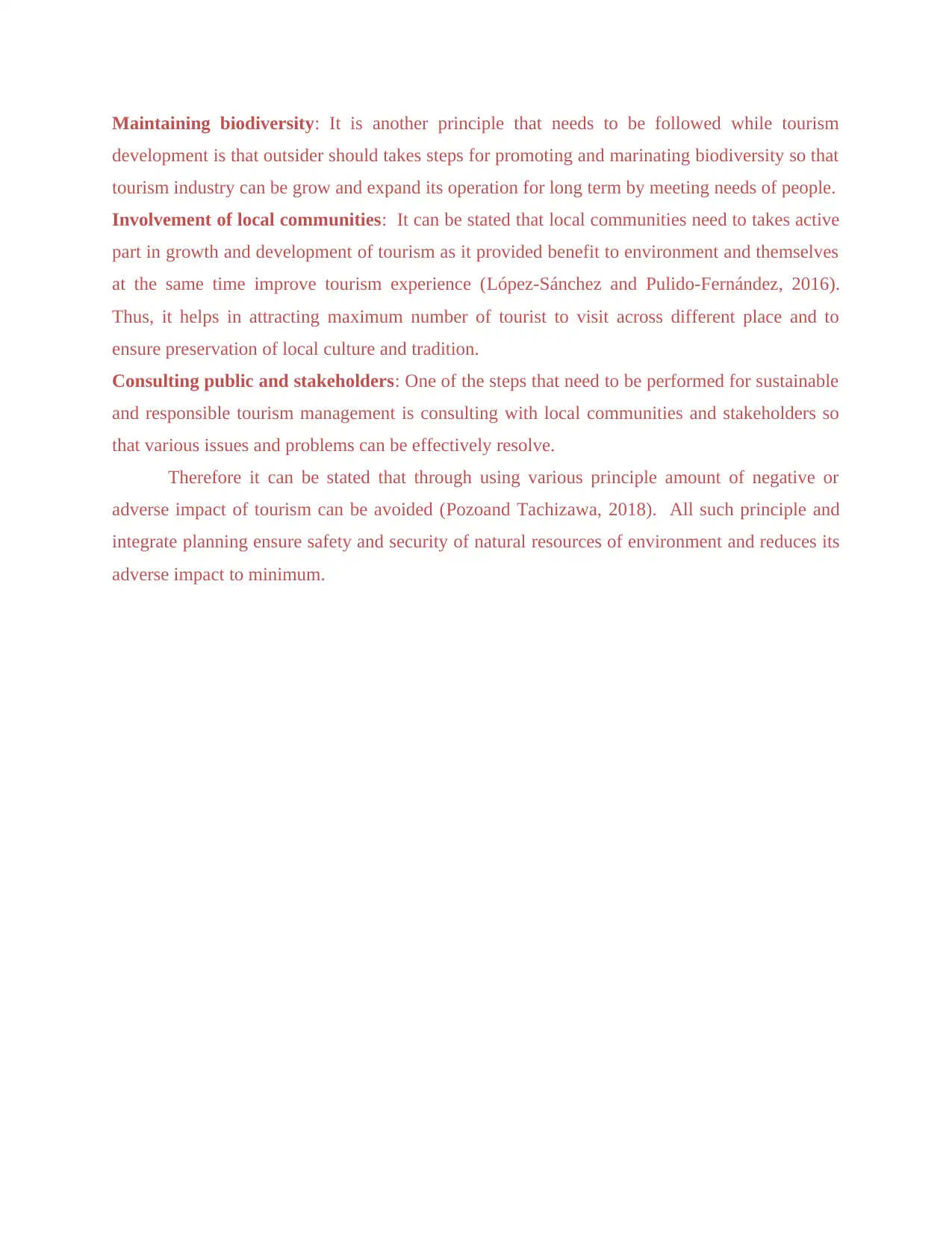
Maintaining biodiversity: It is another principle that needs to be followed while tourism
development is that outsider should takes steps for promoting and marinating biodiversity so that
tourism industry can be grow and expand its operation for long term by meeting needs of people.
Involvement of local communities: It can be stated that local communities need to takes active
part in growth and development of tourism as it provided benefit to environment and themselves
at the same time improve tourism experience (López-Sánchez and Pulido-Fernández, 2016).
Thus, it helps in attracting maximum number of tourist to visit across different place and to
ensure preservation of local culture and tradition.
Consulting public and stakeholders: One of the steps that need to be performed for sustainable
and responsible tourism management is consulting with local communities and stakeholders so
that various issues and problems can be effectively resolve.
Therefore it can be stated that through using various principle amount of negative or
adverse impact of tourism can be avoided (Pozoand Tachizawa, 2018). All such principle and
integrate planning ensure safety and security of natural resources of environment and reduces its
adverse impact to minimum.
development is that outsider should takes steps for promoting and marinating biodiversity so that
tourism industry can be grow and expand its operation for long term by meeting needs of people.
Involvement of local communities: It can be stated that local communities need to takes active
part in growth and development of tourism as it provided benefit to environment and themselves
at the same time improve tourism experience (López-Sánchez and Pulido-Fernández, 2016).
Thus, it helps in attracting maximum number of tourist to visit across different place and to
ensure preservation of local culture and tradition.
Consulting public and stakeholders: One of the steps that need to be performed for sustainable
and responsible tourism management is consulting with local communities and stakeholders so
that various issues and problems can be effectively resolve.
Therefore it can be stated that through using various principle amount of negative or
adverse impact of tourism can be avoided (Pozoand Tachizawa, 2018). All such principle and
integrate planning ensure safety and security of natural resources of environment and reduces its
adverse impact to minimum.
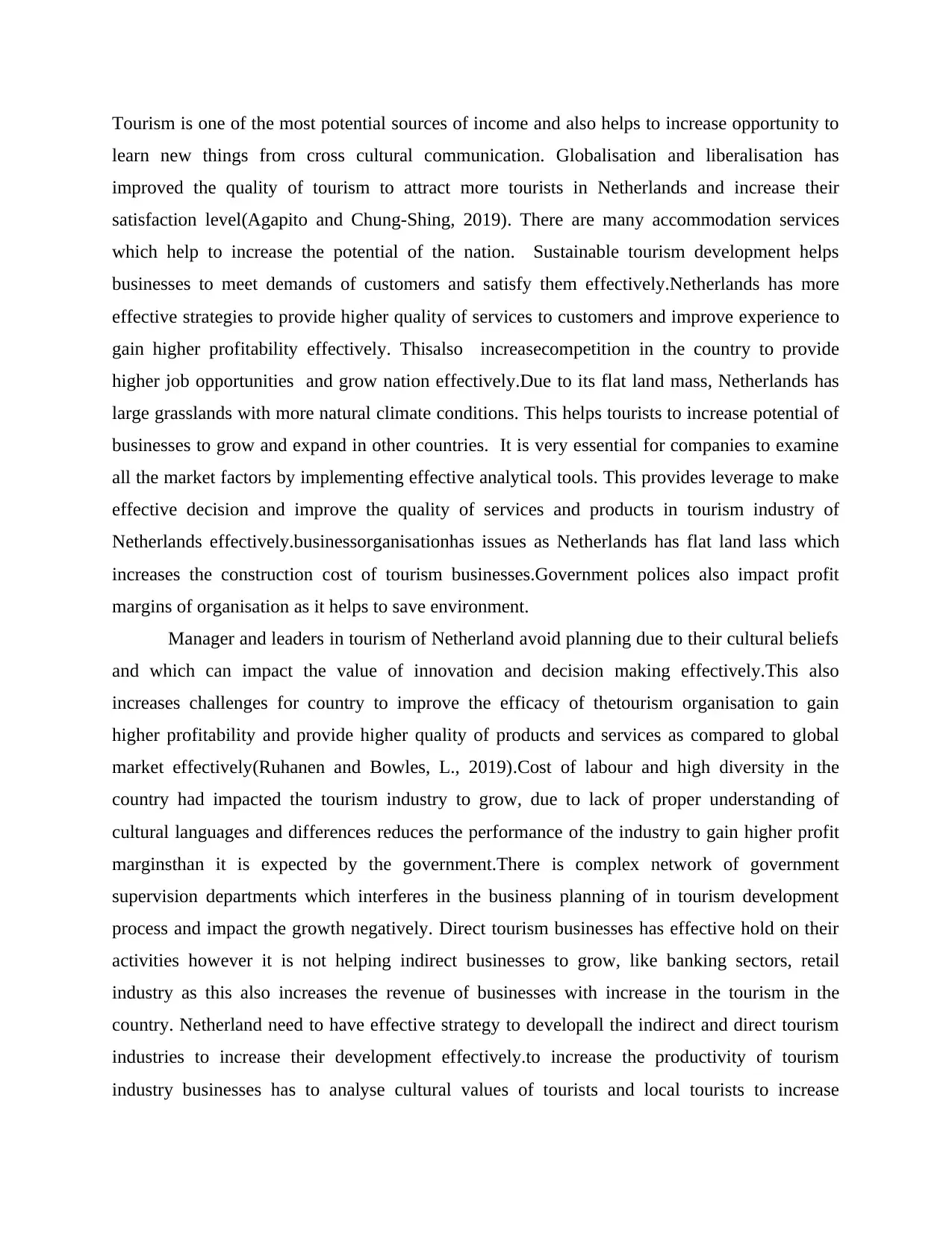
Tourism is one of the most potential sources of income and also helps to increase opportunity to
learn new things from cross cultural communication. Globalisation and liberalisation has
improved the quality of tourism to attract more tourists in Netherlands and increase their
satisfaction level(Agapito and Chung-Shing, 2019). There are many accommodation services
which help to increase the potential of the nation. Sustainable tourism development helps
businesses to meet demands of customers and satisfy them effectively.Netherlands has more
effective strategies to provide higher quality of services to customers and improve experience to
gain higher profitability effectively. Thisalso increasecompetition in the country to provide
higher job opportunities and grow nation effectively.Due to its flat land mass, Netherlands has
large grasslands with more natural climate conditions. This helps tourists to increase potential of
businesses to grow and expand in other countries. It is very essential for companies to examine
all the market factors by implementing effective analytical tools. This provides leverage to make
effective decision and improve the quality of services and products in tourism industry of
Netherlands effectively.businessorganisationhas issues as Netherlands has flat land lass which
increases the construction cost of tourism businesses.Government polices also impact profit
margins of organisation as it helps to save environment.
Manager and leaders in tourism of Netherland avoid planning due to their cultural beliefs
and which can impact the value of innovation and decision making effectively.This also
increases challenges for country to improve the efficacy of thetourism organisation to gain
higher profitability and provide higher quality of products and services as compared to global
market effectively(Ruhanen and Bowles, L., 2019).Cost of labour and high diversity in the
country had impacted the tourism industry to grow, due to lack of proper understanding of
cultural languages and differences reduces the performance of the industry to gain higher profit
marginsthan it is expected by the government.There is complex network of government
supervision departments which interferes in the business planning of in tourism development
process and impact the growth negatively. Direct tourism businesses has effective hold on their
activities however it is not helping indirect businesses to grow, like banking sectors, retail
industry as this also increases the revenue of businesses with increase in the tourism in the
country. Netherland need to have effective strategy to developall the indirect and direct tourism
industries to increase their development effectively.to increase the productivity of tourism
industry businesses has to analyse cultural values of tourists and local tourists to increase
learn new things from cross cultural communication. Globalisation and liberalisation has
improved the quality of tourism to attract more tourists in Netherlands and increase their
satisfaction level(Agapito and Chung-Shing, 2019). There are many accommodation services
which help to increase the potential of the nation. Sustainable tourism development helps
businesses to meet demands of customers and satisfy them effectively.Netherlands has more
effective strategies to provide higher quality of services to customers and improve experience to
gain higher profitability effectively. Thisalso increasecompetition in the country to provide
higher job opportunities and grow nation effectively.Due to its flat land mass, Netherlands has
large grasslands with more natural climate conditions. This helps tourists to increase potential of
businesses to grow and expand in other countries. It is very essential for companies to examine
all the market factors by implementing effective analytical tools. This provides leverage to make
effective decision and improve the quality of services and products in tourism industry of
Netherlands effectively.businessorganisationhas issues as Netherlands has flat land lass which
increases the construction cost of tourism businesses.Government polices also impact profit
margins of organisation as it helps to save environment.
Manager and leaders in tourism of Netherland avoid planning due to their cultural beliefs
and which can impact the value of innovation and decision making effectively.This also
increases challenges for country to improve the efficacy of thetourism organisation to gain
higher profitability and provide higher quality of products and services as compared to global
market effectively(Ruhanen and Bowles, L., 2019).Cost of labour and high diversity in the
country had impacted the tourism industry to grow, due to lack of proper understanding of
cultural languages and differences reduces the performance of the industry to gain higher profit
marginsthan it is expected by the government.There is complex network of government
supervision departments which interferes in the business planning of in tourism development
process and impact the growth negatively. Direct tourism businesses has effective hold on their
activities however it is not helping indirect businesses to grow, like banking sectors, retail
industry as this also increases the revenue of businesses with increase in the tourism in the
country. Netherland need to have effective strategy to developall the indirect and direct tourism
industries to increase their development effectively.to increase the productivity of tourism
industry businesses has to analyse cultural values of tourists and local tourists to increase
⊘ This is a preview!⊘
Do you want full access?
Subscribe today to unlock all pages.

Trusted by 1+ million students worldwide
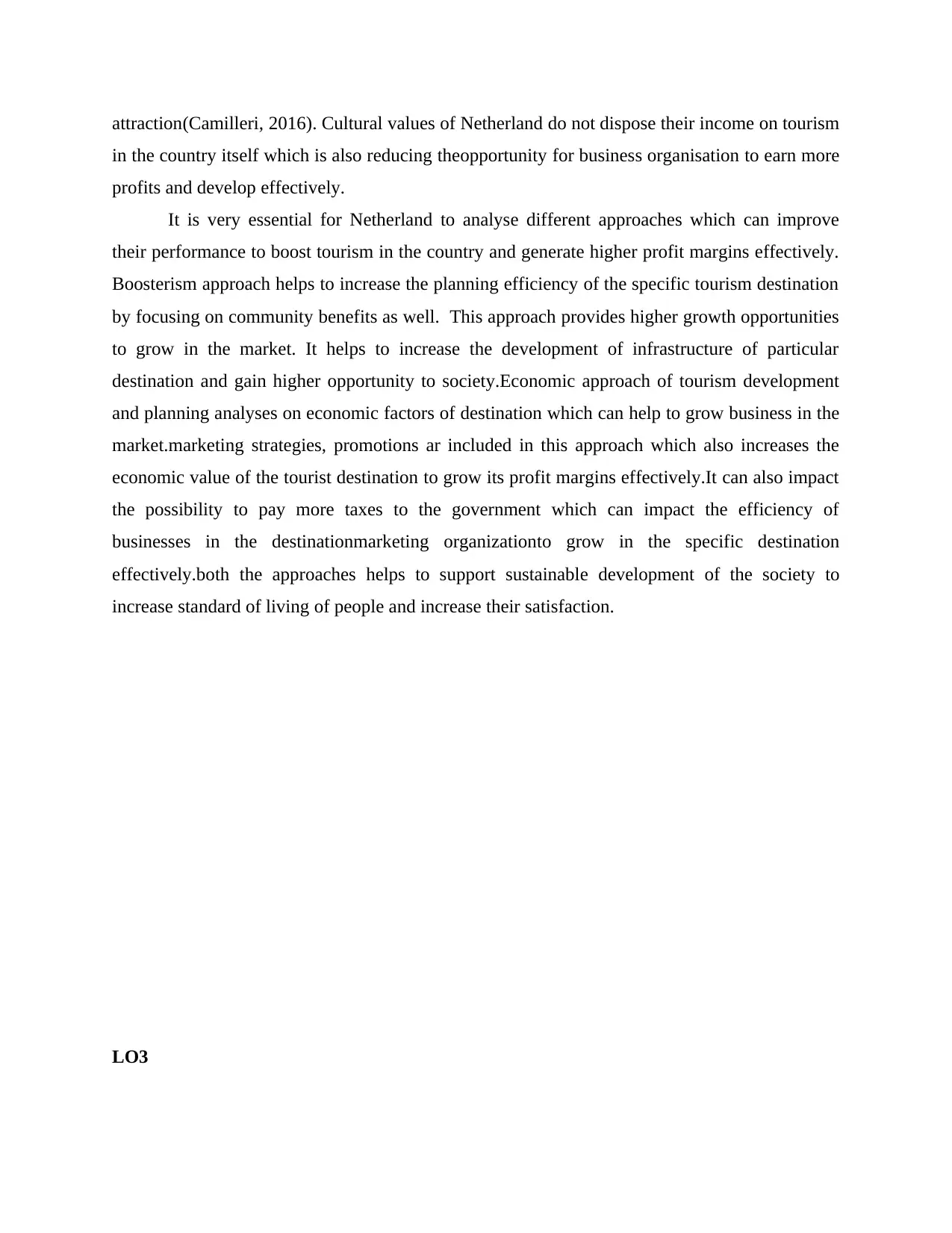
attraction(Camilleri, 2016). Cultural values of Netherland do not dispose their income on tourism
in the country itself which is also reducing theopportunity for business organisation to earn more
profits and develop effectively.
It is very essential for Netherland to analyse different approaches which can improve
their performance to boost tourism in the country and generate higher profit margins effectively.
Boosterism approach helps to increase the planning efficiency of the specific tourism destination
by focusing on community benefits as well. This approach provides higher growth opportunities
to grow in the market. It helps to increase the development of infrastructure of particular
destination and gain higher opportunity to society.Economic approach of tourism development
and planning analyses on economic factors of destination which can help to grow business in the
market.marketing strategies, promotions ar included in this approach which also increases the
economic value of the tourist destination to grow its profit margins effectively.It can also impact
the possibility to pay more taxes to the government which can impact the efficiency of
businesses in the destinationmarketing organizationto grow in the specific destination
effectively.both the approaches helps to support sustainable development of the society to
increase standard of living of people and increase their satisfaction.
LO3
in the country itself which is also reducing theopportunity for business organisation to earn more
profits and develop effectively.
It is very essential for Netherland to analyse different approaches which can improve
their performance to boost tourism in the country and generate higher profit margins effectively.
Boosterism approach helps to increase the planning efficiency of the specific tourism destination
by focusing on community benefits as well. This approach provides higher growth opportunities
to grow in the market. It helps to increase the development of infrastructure of particular
destination and gain higher opportunity to society.Economic approach of tourism development
and planning analyses on economic factors of destination which can help to grow business in the
market.marketing strategies, promotions ar included in this approach which also increases the
economic value of the tourist destination to grow its profit margins effectively.It can also impact
the possibility to pay more taxes to the government which can impact the efficiency of
businesses in the destinationmarketing organizationto grow in the specific destination
effectively.both the approaches helps to support sustainable development of the society to
increase standard of living of people and increase their satisfaction.
LO3
Paraphrase This Document
Need a fresh take? Get an instant paraphrase of this document with our AI Paraphraser
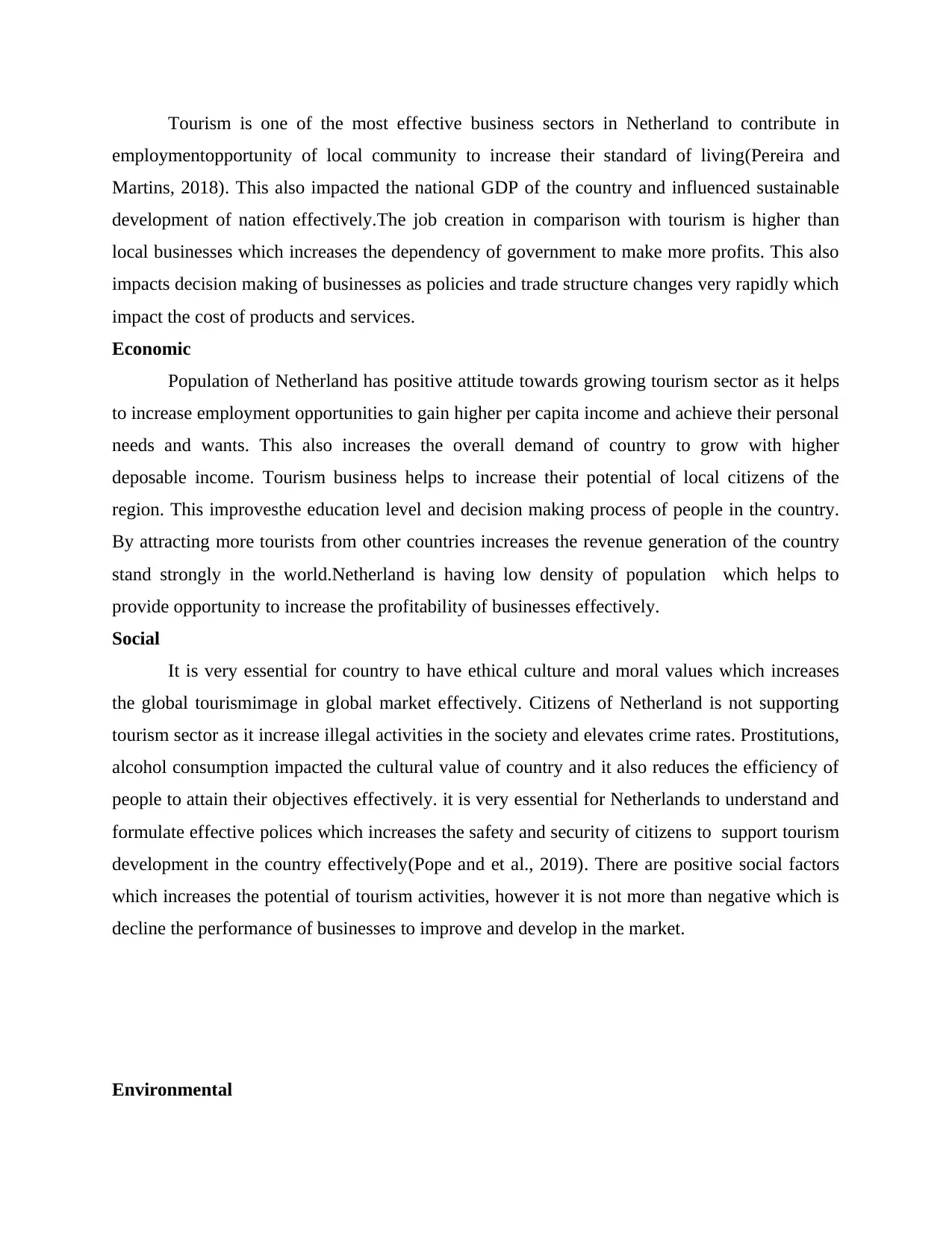
Tourism is one of the most effective business sectors in Netherland to contribute in
employmentopportunity of local community to increase their standard of living(Pereira and
Martins, 2018). This also impacted the national GDP of the country and influenced sustainable
development of nation effectively.The job creation in comparison with tourism is higher than
local businesses which increases the dependency of government to make more profits. This also
impacts decision making of businesses as policies and trade structure changes very rapidly which
impact the cost of products and services.
Economic
Population of Netherland has positive attitude towards growing tourism sector as it helps
to increase employment opportunities to gain higher per capita income and achieve their personal
needs and wants. This also increases the overall demand of country to grow with higher
deposable income. Tourism business helps to increase their potential of local citizens of the
region. This improvesthe education level and decision making process of people in the country.
By attracting more tourists from other countries increases the revenue generation of the country
stand strongly in the world.Netherland is having low density of population which helps to
provide opportunity to increase the profitability of businesses effectively.
Social
It is very essential for country to have ethical culture and moral values which increases
the global tourismimage in global market effectively. Citizens of Netherland is not supporting
tourism sector as it increase illegal activities in the society and elevates crime rates. Prostitutions,
alcohol consumption impacted the cultural value of country and it also reduces the efficiency of
people to attain their objectives effectively. it is very essential for Netherlands to understand and
formulate effective polices which increases the safety and security of citizens to support tourism
development in the country effectively(Pope and et al., 2019). There are positive social factors
which increases the potential of tourism activities, however it is not more than negative which is
decline the performance of businesses to improve and develop in the market.
Environmental
employmentopportunity of local community to increase their standard of living(Pereira and
Martins, 2018). This also impacted the national GDP of the country and influenced sustainable
development of nation effectively.The job creation in comparison with tourism is higher than
local businesses which increases the dependency of government to make more profits. This also
impacts decision making of businesses as policies and trade structure changes very rapidly which
impact the cost of products and services.
Economic
Population of Netherland has positive attitude towards growing tourism sector as it helps
to increase employment opportunities to gain higher per capita income and achieve their personal
needs and wants. This also increases the overall demand of country to grow with higher
deposable income. Tourism business helps to increase their potential of local citizens of the
region. This improvesthe education level and decision making process of people in the country.
By attracting more tourists from other countries increases the revenue generation of the country
stand strongly in the world.Netherland is having low density of population which helps to
provide opportunity to increase the profitability of businesses effectively.
Social
It is very essential for country to have ethical culture and moral values which increases
the global tourismimage in global market effectively. Citizens of Netherland is not supporting
tourism sector as it increase illegal activities in the society and elevates crime rates. Prostitutions,
alcohol consumption impacted the cultural value of country and it also reduces the efficiency of
people to attain their objectives effectively. it is very essential for Netherlands to understand and
formulate effective polices which increases the safety and security of citizens to support tourism
development in the country effectively(Pope and et al., 2019). There are positive social factors
which increases the potential of tourism activities, however it is not more than negative which is
decline the performance of businesses to improve and develop in the market.
Environmental
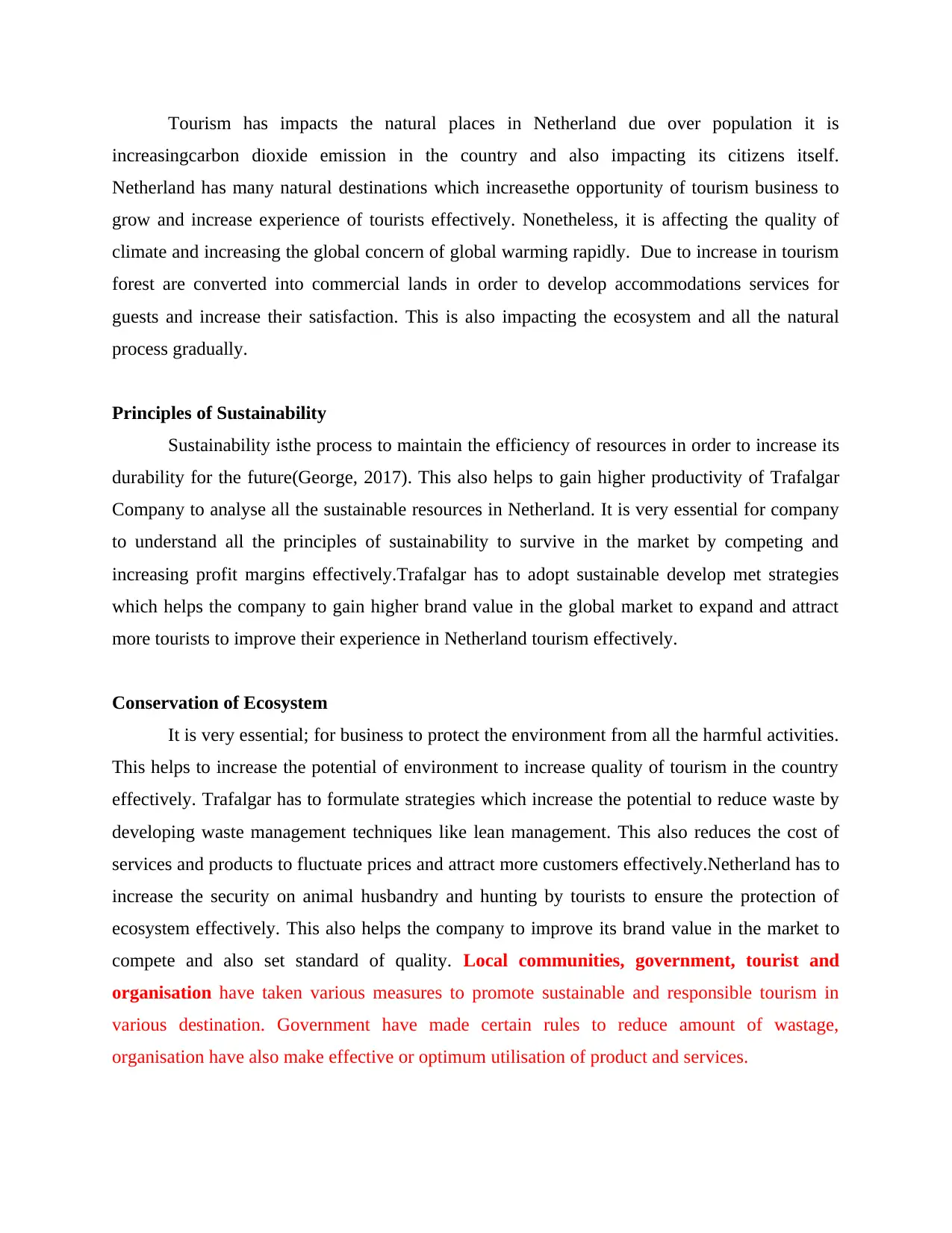
Tourism has impacts the natural places in Netherland due over population it is
increasingcarbon dioxide emission in the country and also impacting its citizens itself.
Netherland has many natural destinations which increasethe opportunity of tourism business to
grow and increase experience of tourists effectively. Nonetheless, it is affecting the quality of
climate and increasing the global concern of global warming rapidly. Due to increase in tourism
forest are converted into commercial lands in order to develop accommodations services for
guests and increase their satisfaction. This is also impacting the ecosystem and all the natural
process gradually.
Principles of Sustainability
Sustainability isthe process to maintain the efficiency of resources in order to increase its
durability for the future(George, 2017). This also helps to gain higher productivity of Trafalgar
Company to analyse all the sustainable resources in Netherland. It is very essential for company
to understand all the principles of sustainability to survive in the market by competing and
increasing profit margins effectively.Trafalgar has to adopt sustainable develop met strategies
which helps the company to gain higher brand value in the global market to expand and attract
more tourists to improve their experience in Netherland tourism effectively.
Conservation of Ecosystem
It is very essential; for business to protect the environment from all the harmful activities.
This helps to increase the potential of environment to increase quality of tourism in the country
effectively. Trafalgar has to formulate strategies which increase the potential to reduce waste by
developing waste management techniques like lean management. This also reduces the cost of
services and products to fluctuate prices and attract more customers effectively.Netherland has to
increase the security on animal husbandry and hunting by tourists to ensure the protection of
ecosystem effectively. This also helps the company to improve its brand value in the market to
compete and also set standard of quality. Local communities, government, tourist and
organisation have taken various measures to promote sustainable and responsible tourism in
various destination. Government have made certain rules to reduce amount of wastage,
organisation have also make effective or optimum utilisation of product and services.
increasingcarbon dioxide emission in the country and also impacting its citizens itself.
Netherland has many natural destinations which increasethe opportunity of tourism business to
grow and increase experience of tourists effectively. Nonetheless, it is affecting the quality of
climate and increasing the global concern of global warming rapidly. Due to increase in tourism
forest are converted into commercial lands in order to develop accommodations services for
guests and increase their satisfaction. This is also impacting the ecosystem and all the natural
process gradually.
Principles of Sustainability
Sustainability isthe process to maintain the efficiency of resources in order to increase its
durability for the future(George, 2017). This also helps to gain higher productivity of Trafalgar
Company to analyse all the sustainable resources in Netherland. It is very essential for company
to understand all the principles of sustainability to survive in the market by competing and
increasing profit margins effectively.Trafalgar has to adopt sustainable develop met strategies
which helps the company to gain higher brand value in the global market to expand and attract
more tourists to improve their experience in Netherland tourism effectively.
Conservation of Ecosystem
It is very essential; for business to protect the environment from all the harmful activities.
This helps to increase the potential of environment to increase quality of tourism in the country
effectively. Trafalgar has to formulate strategies which increase the potential to reduce waste by
developing waste management techniques like lean management. This also reduces the cost of
services and products to fluctuate prices and attract more customers effectively.Netherland has to
increase the security on animal husbandry and hunting by tourists to ensure the protection of
ecosystem effectively. This also helps the company to improve its brand value in the market to
compete and also set standard of quality. Local communities, government, tourist and
organisation have taken various measures to promote sustainable and responsible tourism in
various destination. Government have made certain rules to reduce amount of wastage,
organisation have also make effective or optimum utilisation of product and services.
⊘ This is a preview!⊘
Do you want full access?
Subscribe today to unlock all pages.

Trusted by 1+ million students worldwide
1 out of 18
Related Documents
Your All-in-One AI-Powered Toolkit for Academic Success.
+13062052269
info@desklib.com
Available 24*7 on WhatsApp / Email
![[object Object]](/_next/static/media/star-bottom.7253800d.svg)
Unlock your academic potential
Copyright © 2020–2026 A2Z Services. All Rights Reserved. Developed and managed by ZUCOL.





